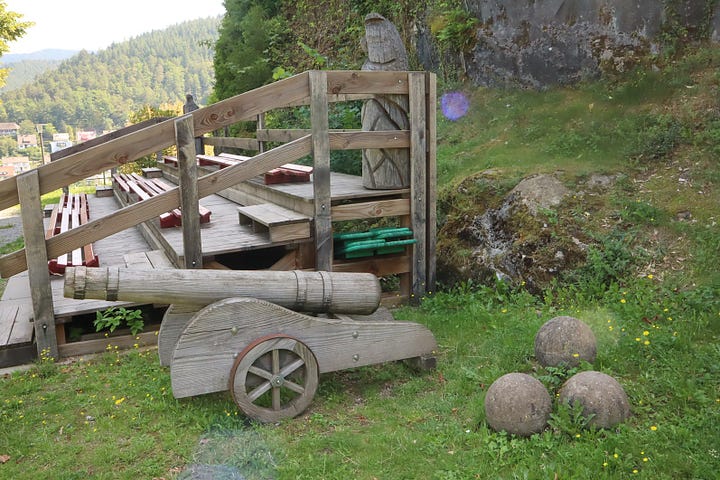Mentatrixes #9: Don't Shoot Your Gunpowder Too Soon!
A Medieval Festival in a History-Laden Black Forest Town
Each week, a story prompting you to reflect on your choices, habits, and contexts. If you can relate, it may also inspire you.
Early September I went to a Medieval Festival in Hornberg, a small town nestled in a Black Forest valley. It promised all the ingredients of medieval charm: grilled food, beer, wine, craft artists, demos of the local archers club, colourful costumes, and live medieval music.
Besides, it took place on the site of the castle ruin that is perched up on a steep mound and stands for the thousand-year history of the town. I knew I couldn’t miss the event.




My daughter and I put on long summer dresses, to look more “medieval”, and headed for the castle. The entrance required a toll of five Taler, but they were also happy with euro. First thing to do on a summer afternoon, after climbing the steep path: get liquid refreshment. Beer and wine was handed out in quaint mugs, against a significant deposit.
“But we’re keeping them, right?” my daughter knew right away.
Hornberg is known, if at all, for what Germans say “Hornberger shooting”. The English-language internet sources translate it as “futile efforts”. Famous authors like Schiller or Hannah Arendt have used it in the context of “it all goes out like the Hornberger shooting”, that is, with a lot of noise but no real effect.
Although historically there are competing legends to explain the origin of this phrase, the town of Hornberg seems to be inclined for one in particular.
In the sixteenth century, the town was to be visited by the Duke of Württenberg. To honour the VIP, the town decided to welcome him with a gunfire salute — the main tower of the Hornberger castle sheltered gunpowder, after all!
On the day the duke was expected to arrive, the watchman peers into the distance, while the soldiers wait by their canons, waiting for the signal from the tower. And behold, a dust cloud is coming near! The watchman gives the signal, and off go the canons!
It turns out, though, that it was just a cattle herd. The canons are reloaded, and the watchman takes up his position on the turret again. Gossip says he might have had a few beers too many. It was a hot day, after all, and the town’s brewer had the beer kegs stored cool inside the mountain.
But then, another dust cloud drawing near. This must be the duke! The canons go off again – but no! this time it was the post coach! New boxes of powder are fetched, and the canons are loaded again. But the third time, the dust cloud was a traders’ cart.
Great disappointment, great losses. The gunpowder is out, the canons can be set back idle.
When the duke arrives, the townspeople welcome him with cries of “piff-paff”, hoping they would come close to canons going loose. The duke, instead, takes it for a bad joke and is offended.
“Futile efforts” is only part of the story, as you can see.
The full story is that you’ve gone all in, repeatedly, on things you took for the great opportunity you were expecting; and when that great opportunity does come up, you’ve got nothing left to go on to honour it. “Don’t fire your gunpowder too soon,” the town of Hornberg warns on the informative board that stands on the trail around the castle.
Can you think of times when you chose the oversized response?
Maybe expressed anger, love, exultation – or declared loyalty, support, disapproval – in such strong terms, repeatedly, over matters that were not deserving such intensity? To the point that these expressions started sounding hollow, pretentious, or even deceitful? So that when the truly decisive moment came, no unused words were left to honour those feelings?
Or maybe you demanded attention, cried for help, asked for favours too big for your real need? To the point that your demands started putting people off, and when the truly critical junction was reached, nobody was available?
Or even, leaving the others aside: have you invested efforts, energies, and creative saps in projects that were less deserving? So that when the truly life project came up, you felt you’d already spent your gift of dedication?
And if you do recall such moments: have you found a way to calibrate your responses to match the situation?
How can we achieve a grand reset, so we can gain back credibility in a new register of behaviour and self-expression?
The Hornberger shooting is also about situations when there’s a lot of fuss over something, but nothing comes out in the end. It may start with a boom and end with a whimper: great expectations, hopes, or enthusiasm go down the drain. A great show and announcements are made of grand projects, only to end in oblivion.
It may be about disappointment; it may also be about a reflection on the fragility of our enterprises; or it may even be about resentment at having been deceived. Does any of this resonate with you?
And if it does, how has it changed you? Do you have a scepticism tactic that you activate whenever you hear big words? Have you covered your heart in a shell? (A great Romanian poem goes something like: after I’ve put on the shell of a hundred-year-old tortoise, and fitted myself with armour and shields, I replied: I love you, too, sweetheart!)
Taking it even further, I think we can also detect the broad theme of truth and delusion: is what we see really what we think it is?
Maybe it’s wise to pause, investigate, and verify before “shooting our powder”. Could it be we see what we’re expecting, hoping, wishing to see?
So much thinking over a legend born in a little town lost in the hills of the Black Forest!
My daughter and I left the festival close to midnight. We took the mugs home to keep the cosy memory of a late summer sunset in medieval costumes.








Hi there, Zoe!
I just joined Substack and stumbled upon your awesome content. I'm really impressed, and I hope your channel continues to flourish. Count me in as a new subscriber to your newsletter!
I'm also working on growing my Substack with like-minded folks who share an interest in my content. If you're up for it, I've got a brand-new 20-minute read eBook all about success: https://goalsnewsletter.substack.com/p/unlocking-success-the-supreme-inquiry
Feel free to give it a go, and if it resonates with you, you might consider joining my newsletter community as well. 😊
Have a great day, much love!
LOVE THIS. Many truths within this piece.
1. This can often be me with my business clients:
"The full story is that you’ve gone all in, repeatedly, on things you took for the great opportunity you were expecting; and when that great opportunity does come up, you’ve got nothing left to go on to honour it." YOU'VE GOT TO HOLD SOME OF YOUR GREAT IDEAS BACK AND RELEASE THEM WHEN TIME IS RIGHT.
2. Again, I can identify:
"You invested efforts, energies, and creative saps in projects that were less deserving."
3. And finally:
"the broad theme of truth and delusion: is what we see really what we think it is?"
Never has this been more truth than today. We often can't trust what we read and see, making it hard to form educated opinions steeped in truth.
Zoe, very well done!